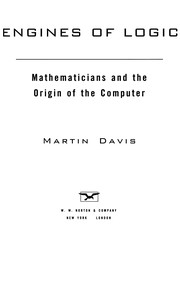Check nearby libraries
Buy this book

"Computers are everywhere today - at work; in art studios; in banks, grocery stores, and homes throughout the world; sometimes even in our pockets - yet they remain to many of us objects of irreducible mystery. How can today's electronic wizardry perform such a bewildering variety of tasks if computing is simply glorified arithmetic?
The answer, as Martin Davis lucidly illustrates, lies in the fact that computers are essentially engines of logic, using concepts developed step by step over centuries by mathematical pioneers.".
"Emergence of the logical concepts underlying computers is traced here through the lives of a group of brilliant innovators - primarily German and British - spanning three centuries: G. W. Leibniz, George Boole, Gottlob Frege, Georg Cantor, David Hilbert, Kurt Godel, and Alan Turing. Each of them in one way or another was concerned with the nature of human reason and was determined to push forward the stuff of life into a better understanding of how people infer - that is, how we use logic.
None of them, except for Alan Turing in our own century, understood that their work would form the intellectual matrix out of which would emerge the all-purpose digital computer." "The Universal Computer brings the story together and underscores the power of ideas. Readers will come away with a revelatory understanding of how and why computers work and how the algorithms within them came to be."--BOOK JACKET.
Check nearby libraries
Buy this book

Previews available in: English
| Edition | Availability |
|---|---|
|
1
Engines of logic: mathematicians and the origin of the computer
2000, Norton
in English
0393047857 9780393047851
|
aaaa
|
Book Details
Edition Notes
Includes bibliographical references and index.
Classifications
The Physical Object
ID Numbers
Community Reviews (0)
Feedback?| July 13, 2024 | Edited by MARC Bot | import existing book |
| June 30, 2019 | Edited by MARC Bot | import existing book |
| December 4, 2010 | Edited by Open Library Bot | Added subjects from MARC records. |
| December 10, 2009 | Created by WorkBot | add works page |









